Types of Parenting Styles and Their Effects on Children

In this article
You love your children and want to raise them to be confident, mentally strong, intelligent, and successful. But where should you begin and what is the best parenting style to support healthy growth and development of your kids?
Parenting styles vary from person to person. Some parents are strict and expect their children to do exactly what they say, while others allow their kids to make their own choices on just about everything. Some parents are vigilant, while others are distant.
Although it’s not easy to find actual cause-and-effect links between specific actions of parents and later behavior of their children, developmental psychologists agree that parenting styles have a big impact on how children develop into adults.
In this article, we’ll talk about different parenting styles and their impact on child development.
Types of parenting styles
The parenting styles commonly used in child psychology today are based on the work of psychologist Diana Baumrind and Stanford researchers Eleanor Maccoby and John Martin.
Based on how demanding parents are and how responsive they are to their children’s needs, parenting styles fall under four main categories:
- Authoritarian parents place high demands on their children but offer little nurturing or responsiveness.
- Authoritative parents are both highly responsive and highly demanding of their kids.
- Permissive parents place very few demands or expectations for behavior and are highly responsive to their children.
- Uninvolved parents show both low responsiveness and low levels of demands for their kids.
Each parenting style takes a different approach to raising children and has different effects on multiple aspects of a child’s life, including motivation and self-discipline, self-esteem, behavior, and socialization. Let’s take a closer look at how parenting styles affect a child’s personality.
Authoritarian parenting
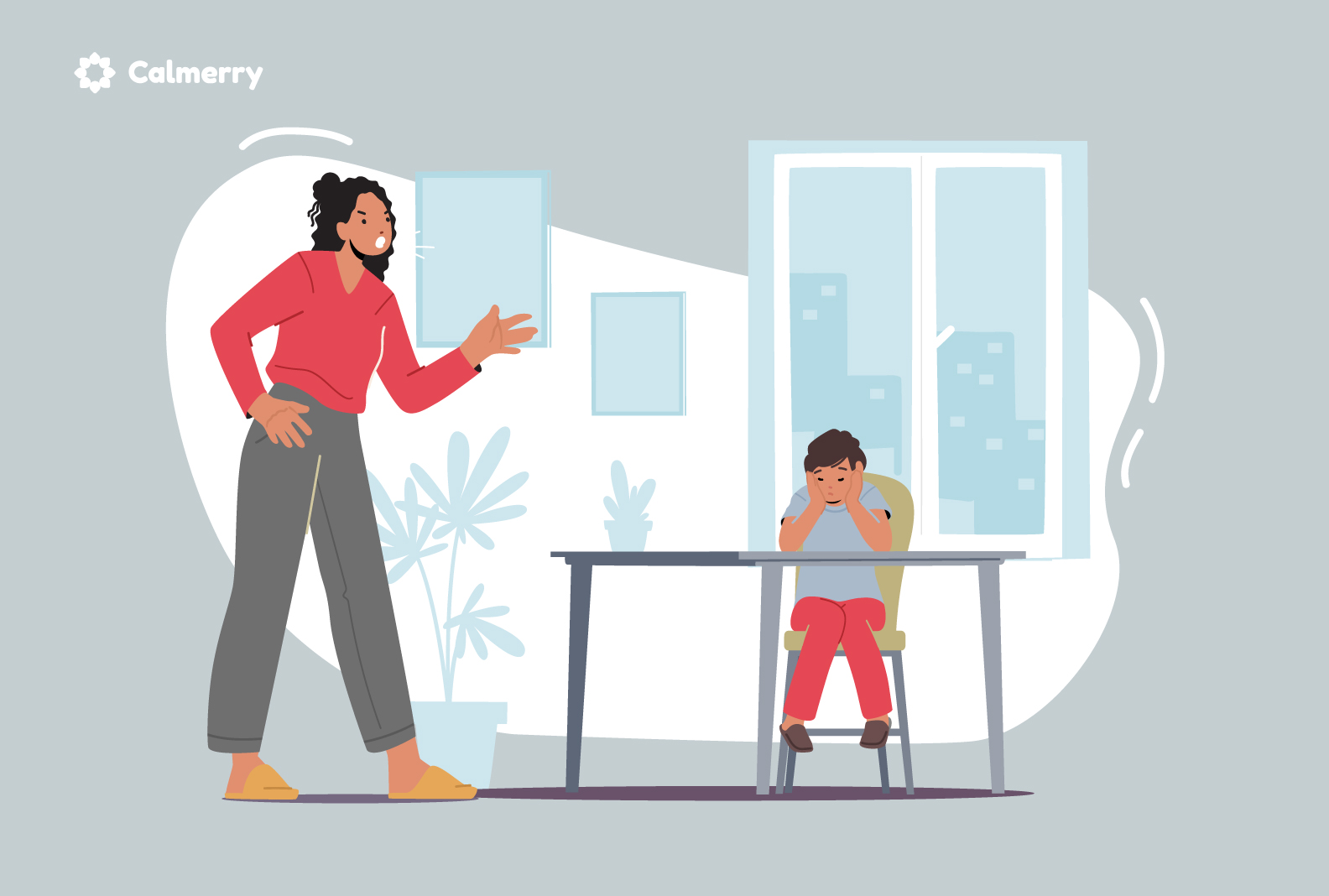
It’s an extremely strict parenting style. Authoritarian parents focus more on discipline, obedience, control, and harsh methods of punishment. They believe that children should strictly follow the rules established by their parents without exception, and they don’t explain the reasoning behind these rules. Their only explanation is often “because I said so.”
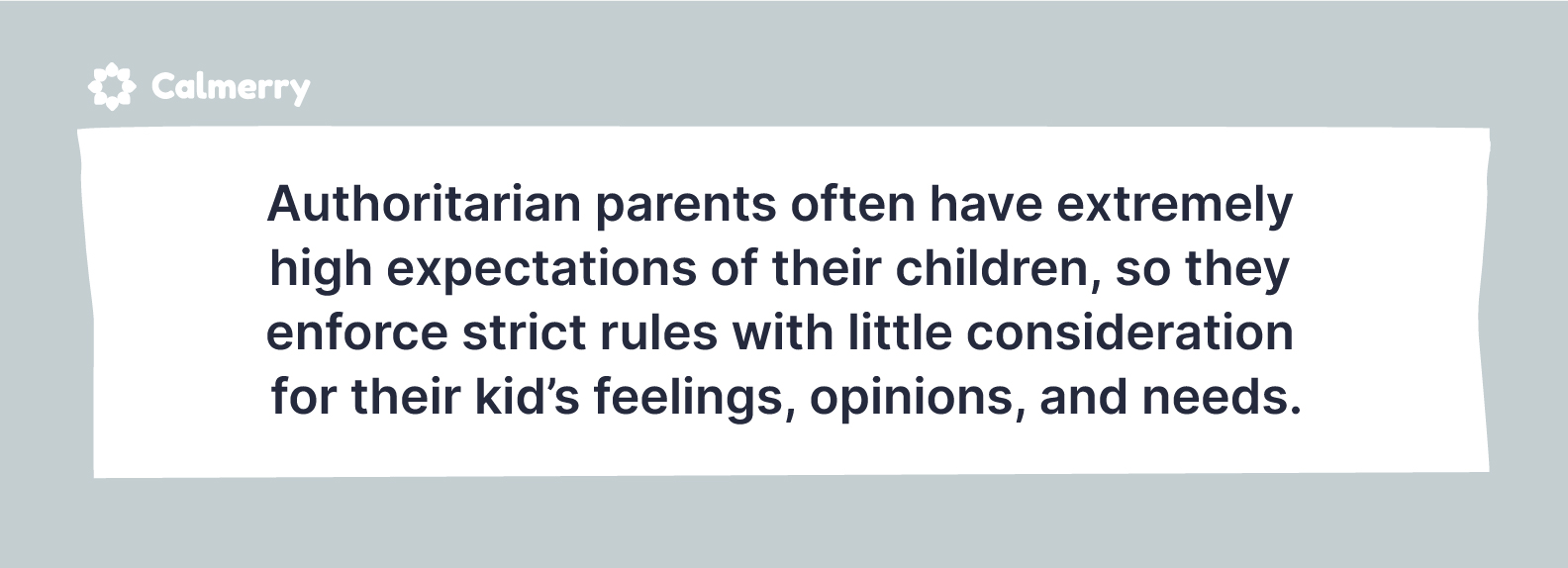
Authoritarian parents often have extremely high expectations of their children, so they enforce strict rules with little consideration for their kid’s feelings, opinions, and needs. Kids are expected to behave exceptionally and not make errors, and are punished for failures. The parent-child relationship tends to lack warmth, and communication is typically one way – from parents to child.
How it affects kids:
On the plus side, kids who grow up with authoritarian parents know exactly where the boundaries are and what consequences they will face for violating them. They understand the importance of respecting and following the rules and are less likely to make impulsive decisions. They typically do quite well in school and are unlikely to engage in risk-taking behaviors.
Still, the consequences of authoritarian parenting are more negative than positive:
- Children are at a higher risk of developing self-esteem problems because criticizing makes them doubt their worth and potential, and their opinions aren’t valued
- They may also be more hostile and aggressive outside the home and might rebel when they become teenagers
- They may grow to become good liars to avoid punishment
- They tend to be less independent and have trouble deciding things for themselves
- They have worse coping skills and are more prone to mental health issues like anxiety and depression
Authoritative parenting
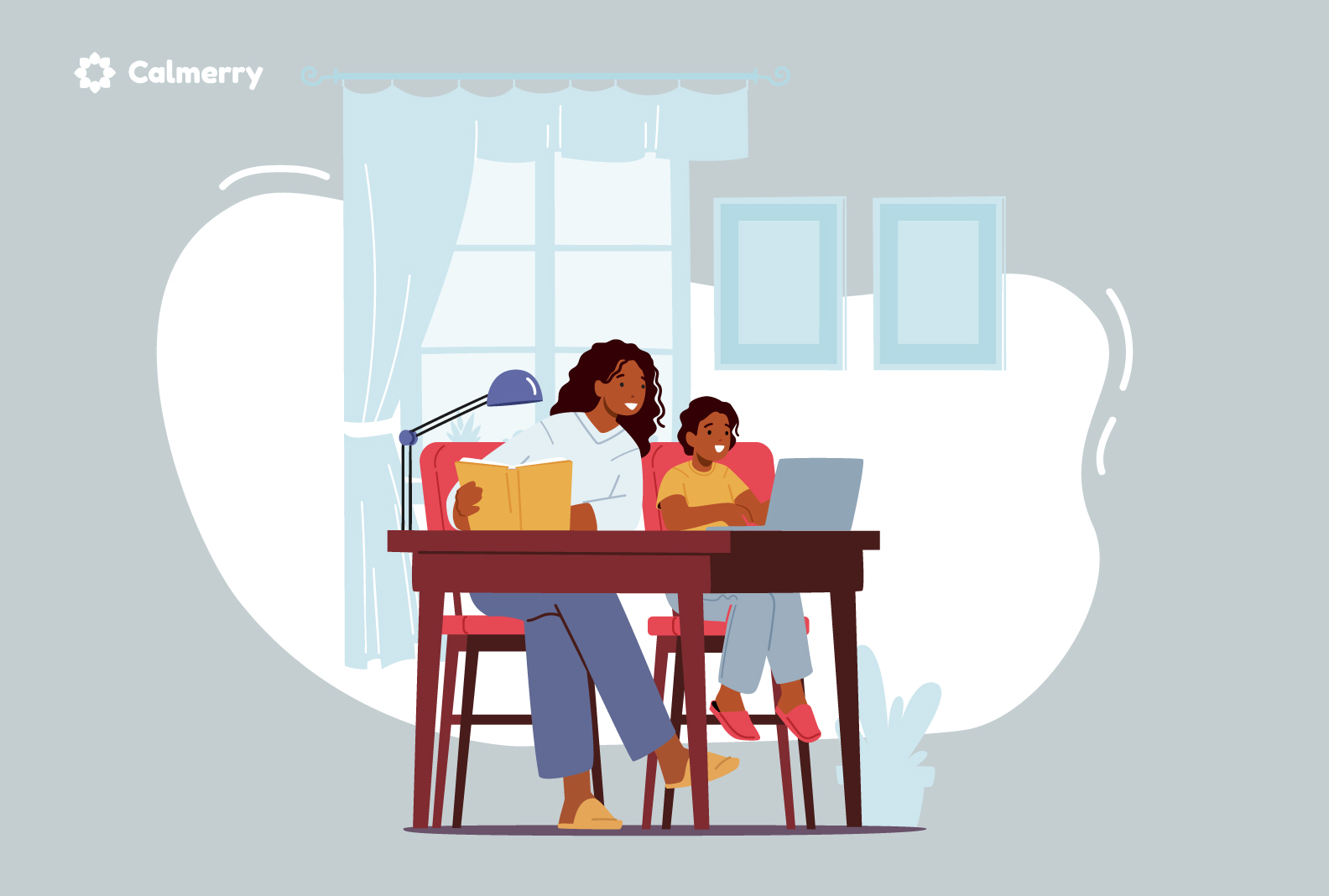
Authoritative parents also expect a lot from their kids, so they set clear and consistent limits and enforce standards. But unlike authoritarian parents, they’re supportive and understanding and are often in tune with their children’s emotional and behavioral needs. They guide their children and help them achieve their goals.
This parenting style is much more democratic than authoritarian. Authoritative parents make it clear that adults are ultimately in charge. Still, they’re willing to listen to their kids’ questions, take their opinions into account, and validate their feelings, fostering independence and reasoning.
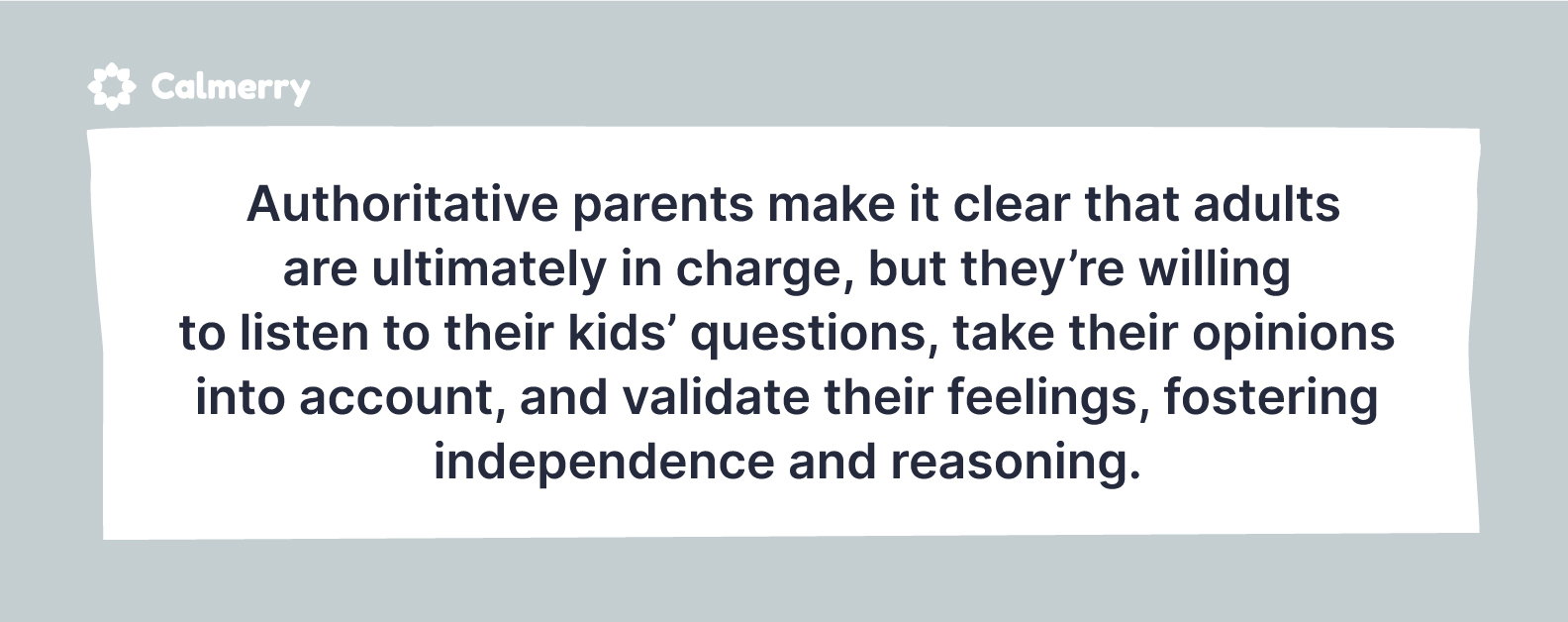
They put an effort to maintain positive, healthy relationships with their kids. They respect their children’s autonomy and give them freedom within a structure that provides guidance. They encourage kids to be self-reliant and create an emotionally safe and stable environment.
They invest their time and energy to prevent behavior problems and allow their kids to make mistakes as an opportunity to learn from them. And their kids know that their parents are always there to support them.
Authoritative parents don’t demand blind obedience from their children – they try to control children’s behavior by explaining the reasoning behind the rules, limits, and consequences they impose. They frequently communicate through open and honest discussions to teach their kids values and reasoning. They also use positive discipline strategies like praise and rewards to reinforce positive behavior.
How it affects kids:
Research has shown that children raised by authoritative parents tend to be energetic, self-controlled, independent, and achievement-oriented. They develop healthy self-esteem and good social skills and are more likely to enjoy positive relationships with their peers. Kids of authoritative parents tend to be happy and more successful. They are most likely to become responsible adults who feel confident to express their opinions and are good at making decisions. Studies also showed that authoritative parenting style results in the development of secure attachment.
Most psychologists agree that authoritative parenting strikes the right balance. It’s comfortable for both kids and parents and produces the healthiest outcome for children. But it requires a lot of patience and effort to implement and ensure a balance of discipline and independence for children. If parents find challenges in achieving this balance or face difficulties with their child’s behavior, seeking relationship counseling can offer strategies to strengthen the family dynamic. Besides, this parenting style may not work if your child has behavioral problems or some traits that are difficult to manage.
Permissive parenting

Permissive parents are warm, loving, and nurturing, but they’re not demanding, avoid confrontations, and often take on the status of a friend more than that of a parent. They are responsive to their kids’ needs, but they tend to be lenient and inconsistent with setting firm rules and enforcing them.
They set very few rules and boundaries but fail to closely monitor their children’s behavior and don’t always attempt to control them. Permissive parents don’t like to say no and don’t want to disappoint or upset their kids, so they allow them to make the majority of their own decisions rather than giving direction. They typically put their child’s emotional needs and happiness first.
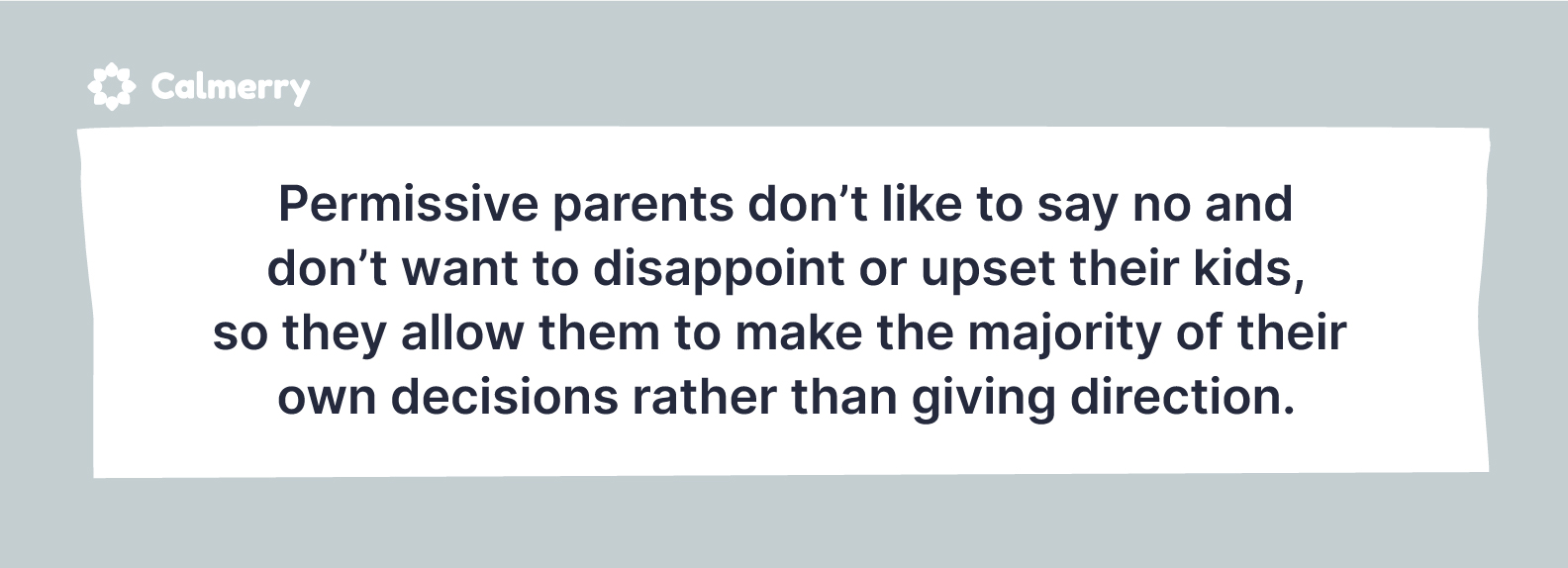
Permissive parents encourage their kids to talk with them about all their problems, but they try to avoid confrontation and conflict, so they don’t put much effort into discouraging bad behavior or poor choices. They fail to meet a child’s developmental needs for rules and limits and mostly allow their children to do what they want.
How it affects kids:
Although most experts don’t encourage this parenting style, children raised by permissive parents tend to be self-confident, creative, and aren’t afraid to speak their minds. They are more resourceful than children with overly strict parents and have good social skills.
But they’re also demanding and selfish and don’t appreciate authority and rules, so it’s difficult for them to adjust to the realities of the outside world. They tend to be impulsive, rebellious, and aggressive. As a result, they encounter many problems in relationships and social interactions. Children of permissive parents lack personal responsibility and can have symptoms of anxiety and depression.
Studies have found that there is a link between permissive parenting and increased alcohol use among teenagers. Kids of permissive parents are also at a higher risk for health problems, like obesity, because parents don’t monitor their snacks and don’t limit junk food intake.
Uninvolved parenting

This style can also be called neglectful parenting and lacks warmth, communication, rules, and clear expectations. Uninvolved parents fulfill their kids’ basic needs, such as shelter, food, and clothing, but they are generally detached from their kids’ life and neglect their other duties as parents. They simply don’t engage much in the parenting role and are unresponsive to their kids’ emotional needs, unavailable, and rejecting.
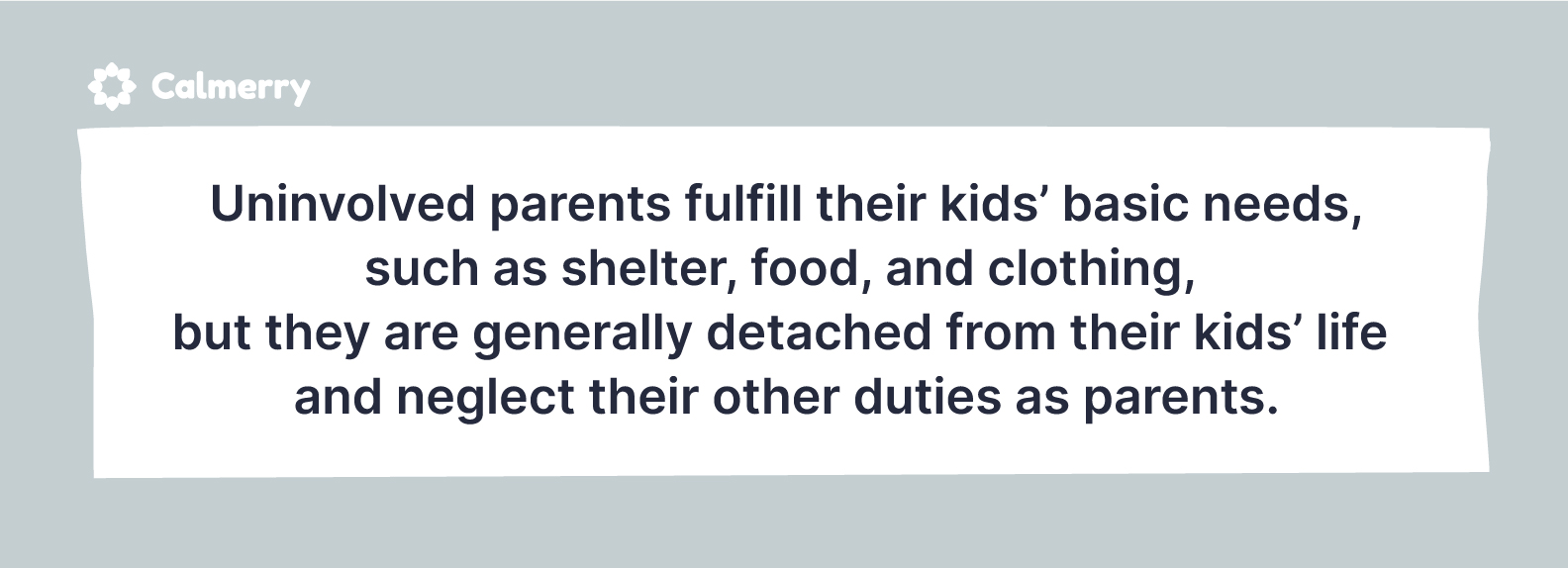
This parenting style is often outside the parent’s control. Such parents might be too overwhelmed with work, managing the household, paying bills, and other life stressors. They might also lack knowledge about parenting and child development. Uninvolved parents tend to have mental health issues like depression or substance abuse problems.
But you should keep in mind that busy parents who have highly demanding jobs are not necessarily uninvolved parents. Although they have less time left for children, they may still be warm and caring. Busy parents can’t frequently spend time together with their kids, but they can show interest in their lives and create emotional connections.
How it affects kids:
Neglectful parenting is probably the most harmful parenting style because it can negatively affect the child’s well-being and development. Children who grow up with uninvolved parents may have low self-esteem and self-confidence and lack self-control and social skills. They tend to seek other, sometimes inappropriate, role models to substitute for their neglectful parents.
Children raised with uninvolved parents are less competent than their peers and struggle with forming close relationships and trusting other people due to withdrawal and fear of abandonment. They often do poorly in school and frequently have behavioral problems. They also have trouble controlling their emotions and are more prone to anxiety and depression.
Research shows that when neglected children grow up, they are 2.6 times more likely to become neglectful parents to their own children and twice as likely to be physically abusive.
Is there a right parenting style?
Most psychologists and experts recommend an authoritative parenting style because there are many studies that have consistently shown its advantages – the combination of warmth and involvement in children’s lives.
Kids of authoritative parents get the love, attention, and acceptance that they need, but they also get clear expectations and age-appropriate limit-setting. An overwhelming volume of research suggests that kids raised by authoritative parents are most likely to grow independent, self-reliant, academically successful, and socially competent.

But although authoritative parenting gets the most praise from experts as the healthiest of all the styles, it doesn’t guarantee success. Every child is unique and responds differently to what they see, hear, and perceive. So what works for one family may not work for another.
There are many cases of children who turned out to be unprincipled in spite of the fact that they were raised by loving and caring parents. And there are cases when kids raised by bossy and controlling parents turned out to be loving and responsible nevertheless.
And you shouldn’t ignore the impact of culture. Authoritative style helps parents raise children who are independent, self-reliant, and responsible. These qualities are favored in western “individualistic” cultures. But in “collectivistic” cultures, such as Korea or China, being compliant and obedient are favored behaviors.
Parenting is not an exact science, so most parents don’t follow any model completely. The most successful parents may change their style depending on the situation. For example, an authoritative parent is likely to become more permissive when their child is ill. And a permissive parent will be strict in a situation where a child’s safety is at stake.
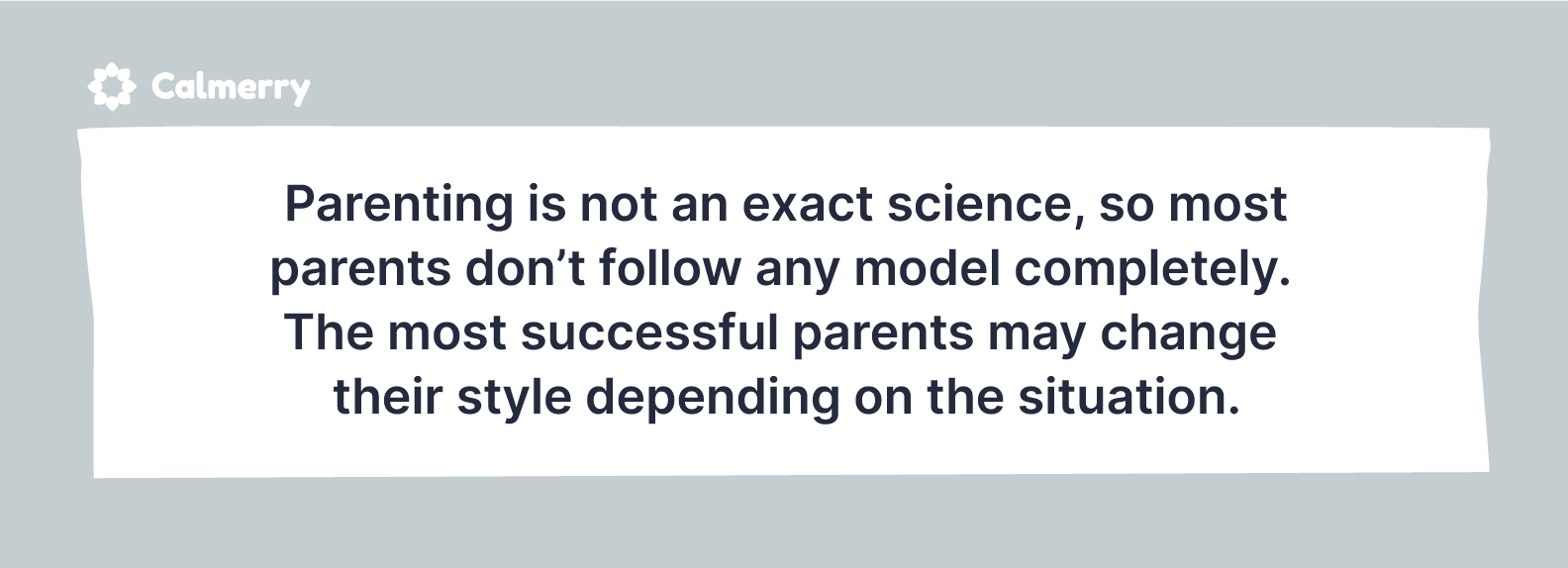
So perhaps the right approach would be to customize your parenting style based on your child’s personality. Use specific parenting practices that work best for your child, keeping your child’s best interest in mind. Be loving, understanding, and supportive, stay tuned to their needs, but also create structure and set boundaries. Make sure your child knows your expectations and clearly explain the reasons behind the rules – underlying safety concerns, moral issues, or societal norms. Then your child will develop a better understanding of life and will be more likely to follow the rules and make good choices.
Final thought
There is no “one-size fits all” when it comes to parenting because people change and adapt as their children grow. But you should remember that how you interact with your child lays the foundation for their personality, life choices, values, and overall behavior.
No matter what parenting style you choose to use, it still boils down to the relationship you as a parent have with your children. The stronger the connection and healthier the parent-child relationship, the better the outcome.
The best approach to parenting is trying to be a good role model for your kids, setting healthy boundaries for them, and teaching them valuable life skills. Calmerry offers support for adults in navigating life’s challenges, you should do your best to help your kids feel accepted and loved so that they can feel confident and capable in their world.
online therapy
live video session



